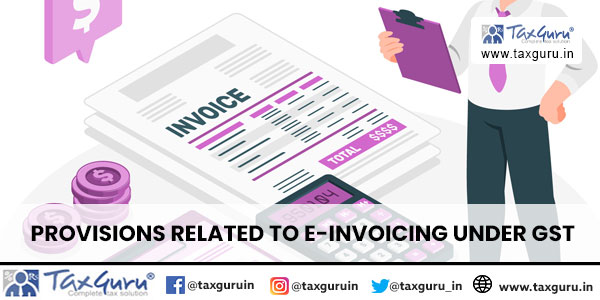E-invoicing under GST is mandated for entities exceeding an aggregate turnover of ₹5 crores in any of the preceding financial year from 17-18, applicable PAN-wise rather than GSTIN-wise. Exceptions include specific sectors like insurance, banking, NBFCs, SEZ units, GTAs, government departments, and more. E-invoicing applies to B2B transactions, export sales (with or without IGST), SEZ sales, deemed exports, and B2B transactions under reverse charge. It excludes unregistered buyers (B2C), with further distinctions between B2CL (large customers with interstate taxable supplies over ₹1,00,000) and B2CS. Only tax invoices, debit notes, and credit notes are covered under e-invoicing provisions, excluding bills of supply. E-invoicing is limited to taxable supplies, excluding exempt, nil-rated, and non-taxable supplies. Both goods and services are covered, provided the above criteria are met. Suppliers must adhere to these provisions to ensure compliance under GST.
1. Turnover criteria:- If turnover of a registered person exceeds the specified limit then e-invoice will be applicable on that entity.
a. Turnover limit:- If turnover exceeds the Rs. 5 crores in any of the preceding financial year from FY 17-18 then from the next financial year e-invoice will be applicable on such entity.
b. Criteria:- Here we will consider the aggregate turnover instead of turnover in a state for applicability of e-invoice. If aggregate turnover exceeds the specified limit then e-invoice will be applicable on all branches.

Example: A company has 10 GSTIN having turnover of Rs 10 Crores in any of the preceding financial year (1 GSTIN = 1 crore turnover). Here aggregate turnover is 10 crores & turnover in a state is 1 crores.
Conclusion: E invoice will be applicable because turnover exceeds the specified limit. Turnover will be considered PAN-wise for applicability instead of GSTIN wise turnover.
2. Types of supplier covered:- There are some exceptions on which e-invoicing is not applicable even turnover exceeds the limits:
a. Insurer
b. Banking company
c. Financial institution
d. NBFC
e. Goods transportation agency (GTA)
f. SEZ unit
g. Passenger transportation services
h. Services related to exhibition of cinematograph films in multiplex
i. Local authority
j. Govt. department
k. OIDAR (Online information & database access or retrieval services).
3. Types of recipient covered:-
All types of recipient are not covered here. Here is the list of buyer on which e-invoicing will be applicable:
a. Business to business transactions (B2B sales)
b. Exports sales with payment of IGST
c. Exports sales without payment of IGST
d. SEZ sale with payment of IGST
e. SEZ sale without payment of IGST
f. Deemed exports sales
g. B2B sales on which RCM is applicable
h. Sale to deemed distinct persons (DDP).
4. Types of recipient not covered:-
a. B2CL: If recipient is unregistered & falls under the category of large customers then e-invoicing will not be applicable.
b. Definition of B2CL: Invoice value of inter-state taxable supplies exceeds the Rs. 1,00,000/- then such type of customers falls under the category of B2CL.
c. B2CS: Recipient other than B2CL category falls under the category of B2CS hence e-invoicing will not be applicable.
Conclusion: If recipient is unregistered then e-invoicing will not be applicable.
5. Types of documents covered:-
Supplier can issue invoice, debit note & credit note to their recipient as per the provision contained in the GST Act.
E-invoicing will be applicable on below mentioned documents:
a. Tax invoice
b. Debit note
c. Credit note
d. Bill of supply not covered in e-invoicing.
6. Nature of supplies:-
All types of supplies not covered under e-invoicing. Supplies may be taxable, exempt or nil rated etc. Below mentioned supplies are covered under e-invoicing:
a. Taxable supplies are covered e-invoicing
b. Exempt supplies are not covered under e-invoicing
c. Nil rated supplies are not covered under e-invoicing
d. Non-taxable supplies are not covered under e-invoicing
Conclusion: Supplier will generate the e-invoice only in case of taxable supplies. If registered person supplying exempt sales then e invoicing will not be applicable.
7. Nature of transactions:
Registered person may be engaged in the supply of good or services. E-invoicing will be applicable if all the above mentioned criteria satisfied irrespective supplier is engaged in the business of selling of good or services.
In case of any queries you may reach out to me at caashishsingla878@gmail.com.
*****
DISCLAIMER:- The views expressed are strictly of the author. The contents of this article are solely for informational purpose. It does not constitute professional advice or recommendation. Author will not accepts any liabilities for any loss or damage of any kind arising out of any information in this article nor for any actions taken in reliance thereon.
(Republished with Amendments)






good information
Thank you.
Turnover should exceed 5 crores only in previous financial year or any year from 2017-2018. I had turnover of 9 crores in 2018-19 then business was shut and restarted now, i am asked to make einvoice even for a 30 lakh turnover. Please clarify
Any word was missing in my article. Sorry for that. We will considered the turnover from the FY 17-18 not only in the preceding financial year.
Yes e invoicing will be applicable. there is no exception if a person shut down the business.